|
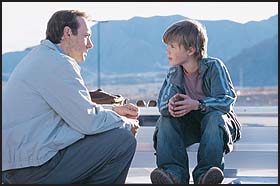


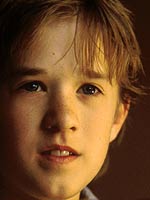
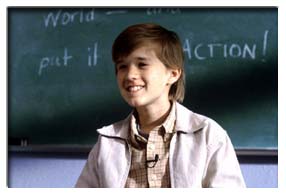
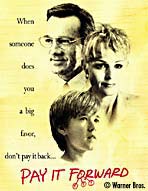
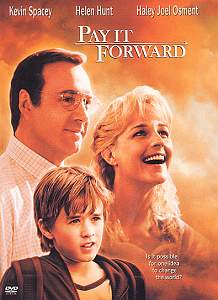

Photo by David James Copyright @warner bros 2000
PAY IT FORWARD
** 1/2 (PG-13)
October 20, 2000
Eugene Simonet: Kevin Spacey
Arlene
McKinney: Helen Hunt
Trevor: Haley Joel Osment
Chris Chandler: Jay Mohr
Jerry: Jim Caviezel
Warner Bros. Pictures presents a film directed by Mimi Leder. Written by Leslie
Dixon. Running time: 122 minutes. Rated PG-13 (for mature thematic elements
including
substance abuse/recovery, some sexual situations, language and brief
violence).
BY ROGER EBERT
Someone does you a good turn. You pass it on to three other people. They pass it
on. And what a wonderful world this will be. That's the theory behind "Pay It
Forward," a movie that might have been more entertaining if it didn't believe it. It's a
seductive
theory, but in the real world, altruism is less powerful than selfishness,
greed, nepotism, xenophobia,
tribalism and paranoia. If you doubt me, take another
look at the front pages.
Consider Las Vegas, the setting of the movie. If every person in trouble there paid it
forward to three
more people, there would be more Gamblers Anonymous members
than gamblers. An intriguing premise, but
not one that occurs to this movie--although
Alcoholics Anonymous plays a supporting role and paying it
forward is of course the
12th step.
The movie has its heart in the right place,
but not its screenplay. It tells a story that
audience members will want to like, but it doesn't tell
it strongly and cleanly enough;
it puts too many loops into the plot, and its ending is shamelessly soapy
for the
material. Two or three times during the film I was close to caving in and going with
the flow, but the story lost the way and I was brought back up to the surface again.
Haley Joel
Osment, the gifted young actor from "The Sixth Sense," stars as Trevor, a
resourceful latchkey
kid whose father has disappeared and whose mother, Arlene
(Helen Hunt), works two jobs as a Vegas cocktail
waitress. She's a recovering
alcoholic with a few relapses still to go. At school, Trevor is impressed
by the grave,
distant presence of his new teacher, Mr. Simonet (Kevin Spacey), whose face is
scarred by burns.
Mr. Simonet doesn't want to win any popularity contests. "Do I strike you
as
someone falsely nice?" he asks Trevor. "No," the boy replies thoughtfully, "you're
not
even really all that nice." But Trevor responds to the lack of condescension in the
teacher's manner: Mr. Simonet has standards and applies them in the classroom. On
the first day of school,
he writes the year's assignment on the blackboard: Think of
an idea that could change the world. Trevor
thinks. Things happen in his life to
help him think and guide his thinking, and before long his mother
discovers that a
homeless man (James Caviezel) is living in their garage. It was Trevor's idea to invite
him in. Then he can pay it forward.
There are complications. One of Trevor's
theories is that his mom and Mr. Simonet
would both be a lot happier if they were dating each other. Mr.
Simonet does not
agree. Spacey does a wonderful job of suggesting the pain just beneath the surface
of the character; the teacher's life is manageable only because he sticks to his routine.
But Trevor plugs
away, all but shoving the two adults toward each other. This is,
unfortunately, the kind of self-propelling
plot device that, once allowed into a movie,
takes it over and dictates an obligatory series of events.
Since it is self-evident that
Trevor is right, we know with a sinking feeling that the screenplay must
detour into
tentative acceptance, hurt rejection, silly misunderstandings, angry retreats,
confessions, tearful reconciliations and resolutions, all in the usual order.
The movie intercuts
between the predictable progress of the romance and the
uncertain progress of Trevor's pay-it-forward
scheme. We meet various supporting
characters who get involved in paying it forward, and the time line
is not always
clear. The movie opens with one of those off-the-shelf hostage crisis scenes that
ends with a criminal crashing into a reporter's car, and a stranger giving the reporter
a new Jaguar.
He's paying it forward. Then we flash back to "four months earlier"
and Trevor's first day of
school, but soon we're back to the present again, as the
reporter tries to track down the pay-it-forward
stories, and the lawyer who gave
away the Jaguar tells why.
This leads to another
flashback: When the lawyer's daughter had an asthma attack
and was ignored in an emergency room, he explains,
a gun-waving
African-American stabbing victim forced a nurse to give the kid oxygen and told him
to pay it forward. It's an effective cameo, but it's awkward the way the movie cuts
between scenes like
that, Trevor's own setbacks and the tentative romance.
With a cleaner story line, the basic idea
could have been free to deliver. As it is, we
get a better movie than we might have, because the performances
are so good:
Spacey as a vulnerable and wounded man; Hunt as a woman no less wounded in her
own way, and Osment, once again proving himself the equal of adult actors in the
complexity and depth
of his performance. I believed in them and cared for them. I
wish the movie could have gotten out of their
way.
Copyright © Chicago Sun-Times Inc.
"Pay
It Forward"
Haley Joel Osment's mom keeps a bottle of vodka in the
chandelier. You would too with a demonic, passive-aggressive,
New Age munchkin trying to run
your life.
- - - - - - - - - - - -
By Andrew O'Hehir
Oct. 20, 2000 | How can a love story featuring two of
Hollywood's most appealing stars be so
excruciating? Partly it's
because "Pay It Forward" marks a newly evolved brand of
cynicism: high-concept moviemaking with one eye on next year's
Oscar ceremony and the other on
the prime-time
newsmagazines. A perfectly acceptable romance, with Kevin
Spacey and Helen Hunt as wounded misfits who find each other
in Las Vegas, gets fatally slimed
by the parallel story of an
angelic little kid (Haley Joel Osment, the tyke from "The Sixth
Sense," playing Hunt's son) who sparks an underground altruism
craze.
I think the filmmakers picture themselves on TV, dressed in
classy Prada suits and discussing Relevant Social Issues with
Stone Phillips: "Can individuals
really make a difference in these
troubled times? The movie that's sparked a surprising movement
for a new personal morality, next."
Even that may be
giving "Pay It Forward" too
much credit. It doesn't have anything to say
about ethics or idealism, even by MSNBC
standards. Without its stars, it's an insultingly
shallow weeper-of-the-week that would make
a Lifetime executive blush. Furthermore, its
falseness runs deeper than a lame stab at
being meaningful. This brightly colored fable
from "Deep Impact" director Mimi Leder (the
screenplay is by Leslie Dixon, from a novel
by Catherine Ryan Hyde) professes a
sentimental adoration for children,
but there's
a hysterical edge to that adoration that makes
it feel
like something much darker.
Essentially, "Pay It Forward" is a paranoid
Christian fantasy in which the world is a place
of evil and ugliness that demands to be
purified through the sacrifice of innocents. I
wasn't much of a Catholic even as a kid, but I
recognize a hagiography when I see one.
Maybe cocktail waitress
Arlene McKinney (Hunt) and
schoolteacher Eugene Simonet (Spacey) would never have
found each other without the intervention of Arlene's son, Trevor
(Osment), a seventh-grader
in Eugene's social studies class. But
how long they can stand to be in the same house with this
impish
know-it-all is another question. The most satisfying moment in
"Pay It Forward" arrives when Arlene hauls off and pops Trevor
one after he tells her,
"I hate the way you look! I hate the way
you smell! I hate that you're my mother!"
The movie's portrayal
of the relationship between children and adults is so confused it's
hard to say who's abusing whom. And at least it shuts up the
little creep for a while.
Hunt has imported her "struggling single mom" shtick pretty
much intact from "As Good as It Gets" (an awfully similar
movie, truth be told) and
it still works, though I'm not exactly
sure why. In that movie she played the only impoverished
WASP in the entire borough of Brooklyn, N.Y.; here she's the
only
white woman in Las Vegas under age 80 who rides the bus.
With her frizzed-out hair, skimpy
outfits and trailer park makeup,
semirecovering alcoholic Arlene looks like Erin Brockovich after
a three-day bender. She probably lives next door to Nomi, the
heroine
of "Showgirls." But amid all the phony trappings of
movieland working-class life, there's
so much that's genuine
about Hunt as a performer -- her screwball klutziness, her desire
to be liked, her slightly frayed sex appeal -- that I couldn't resist
Arlene for more than a
few seconds. Watching competing
emotions work their way across her face (approximately: "I
like
this guy. What's wrong with him? What's wrong with me?")
while Eugene summons up the courage to ask her out is worth
the price of admission all by itself.
As ever, Spacey plays an off-center guy with a secret. In this
case it's not an interesting secret or an especially well-concealed
one, and for all Spacey's
uncanny physical work Eugene remains
a cipher. In the first scene we see him ironing his own
shirts, and
that's about as much character insight as we ever get. Eugene is
a lifelong loner with an untended haircut who wears shabby suits
with running shoes and likes
to show off his collegiate
vocabulary. (Words like "atrophy," "exigent" and
"euphemism"
stick out in a Vegas middle school.)
In short, he's the inscrutable, noble and damaged hero of a
romance novel, rather than an actual
human male. As far as we
or Arlene can tell, he's a virgin. We know he's scarred because,
well, he's scarred. Duh! His face is marked with mysterious
burns, like
Jane Eyre's boss after the fire. When Trevor asks
what happened to him, Leder's camera abruptly
slips sideways,
just in case we hadn't noticed that this is an important question
From salon.com
salon mag
|
